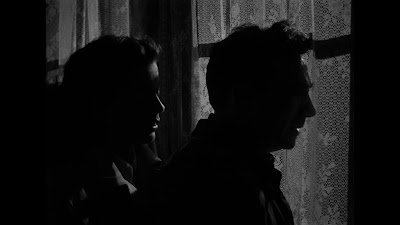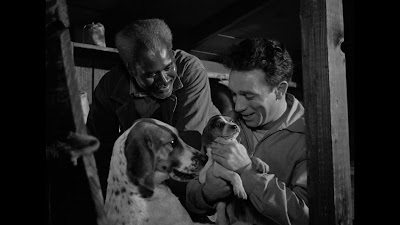Screens of Dark, Light, Pain, Love, Guilt, Innocence, Grief and Rapture. The movie could only be Frank Borzage’s last total masterpiece, Moonrise (1948), adapted from a then popular “redemptive” novel by Theodore Strauss. This is a movie that grabs you by the throat with the opening shot of a man about to be hanged played in both life and shadow play, and doesn’t let you go for more than six minutes until it’s punched its way through every conceivable emotion, wrenching you with it into some sort of stunned, heightened state. (Click on the screen captures to enlarge.)
 |
| Dane Clark, Moonrise |
Borzage’s astonishing mise-en-scène begins with a low angle and high contrast shot of a pending execution. The background then morphs into a surreal undulating shadow play of nightmare, and lap dissolves into the child of that hanged man first shown from above as a baby crying in a room with a hanging doll, then as a boy, now photographed even higher from the top of a high crane for over a minute in a single travelling during which he’s tormented for the “sins” of his dead father by the other boys, in a shot that can only be described as the POV of a “higher being”.
 |
| Lloyd Bridges, Moonrise |
Then begins the narrative of this astonishing film. The image goes to an optical and comes back for the first time to level ground where a now adult Danny Hawkins (Dane Clark) is taunted and fights with Jerry Sykes (Lloyd Bridges) in what must be the most violent sequence played out in a Borzage film. The fight is staged with a découpage that cuts from full face to full face, a visual style that from now completely replaces the shot/reverse trope for the remainder of the film, as every other encounter in it becomes a confrontation, or a dialectic but only until the sublime CUs and two shots, all lyrical expressions of relief from the underlying bleakness of Danny’s separation and solitude.
 |
| Dane Clark, Gail Russell, Moonrise |
Danny is one of Bozage’s cursed, beautiful innocent sinners, and his image, sublimely photographed by John L Russell (fresh from Welles’ superb Macbeth for Republic the same year) donates the constant possibility of grace to him, with Gilly, the woman who loves him (the breathtaking Gail Russell) and the simple mute man with the angelic face, Billy Scripture (Harry Morgan) who also loves him unconditionally bringing him light.
Borzage’s dramaturgy takes the picture away from an original concept of a Noir style film which Republic and producer Charles Haas originally wanted. Borzage crafts the narrative line into a range of moods and tones to allow the picture to breathe, after the unparalleled intensity of the opening sequences. In fact, what he gives us is an ecstatic film composed around a small number of what the cinéphile world used to call “privileged moments”.
 |
| Gail Russell, Dane Clark, Moonrise |
Those moments, which run for several minutes of completely sublime screen time, come with the appearances in the picture of Gilly herself and the deserted house where she and the boy meet twice, in what can only be described as the most rapturous love scenes in American cinema. Danny later meets Mose, played by the great black American actor Rex Ingram, and shares the joy of new life with the birth of a new puppy to Mose’s hound, Daisy. Then there is another late encounter with the mute boy Billy Scripture (Henry Morgan) which is the staggering epiphany, and a glorious meeting with Gilly in the deserted house in which they dance together in the shadows against a ghostly score, sounding like a supernatural orchestra outside of time or space.
 |
| Rex Ingram, Dane Clark, Moonrise |
These must be among the most sublime scenes of transformation and redemption in the movies. Certainly they are among the most beautiful expressions of mood, feelings and ideas in all of Borzage.
 |
| "...they dance together in the shadows against a ghostly score..." |
There has never been a more direct or straightforward director in the depiction of love (of all kinds), and the possibility of transcendence – a dread word, and one which in all honesty as a non-believer I however feel compelled to use to describe very few artists. In the movies I can only extend the honor to Borzage and Mizoguchi.
 |
| Henry Morgan, Moonrise |
Is there a more beautiful black and white film in the American cinema than Moonrise? Watching this new Criterion Blu-ray which was sourced from a new 4K scan mastered and graded to near perfection is hypnotic. The tonal qualities of the original nitrate negative seem to sparkle and shimmer in the new image as they must have in 1948. Matte blacks give way to the gloss of wet shiny blacks with an infinite gradation of grays in shot after shot. While Borzage may shoot darkness for a greater part of the movie, he enlivens darkness with the endless possibilities of life and action.
The Blu-ray delivers a flawless image of this masterpiece which, like most people, I first saw back in the late 60s, in 16mm. During the dying days of Laserdisc Republic itself published a line of Lasers including this and Borzage’s earlier I’ve Always Loved You (1946). The image was serviceable but dull and the film has effectively been a “lost” item for 50 years in repertoire programming. Until now.
 |
| Dane Clark, Moonrise |
Although the new Criterion disc may be disappointingly short on bonus material (there is only a 17 minute interview with Herve Dumont) I urge everyone with the slightest interest to buy. In a year of several incredibly great releases this is now at the top.









No comments:
Post a Comment
Note: only a member of this blog may post a comment.